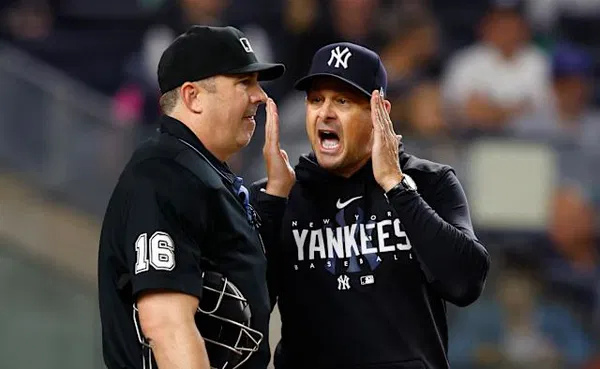
Aaron Boone Ejected Again, Spotlighting MLB’s Umpiring Controversy
Another Yankees game, another ejection for manager Aaron Boone. His frequent clashes with umpires have almost become a staple of the team’s season. Boone’s fiery reactions from the dugout might seem like theatrics to some, but they represent something deeper: a manager determined to protect his players from questionable umpire decisions, even at personal cost.
During a recent game against the Seattle Mariners, Boone once again charged out to confront the officiating crew. The trigger? A ninth-inning called third strike on Jasson Dominguez, who was batting with a runner on second and one out. The pitch—a 1-2 fastball from Mariners closer Andres Munoz—appeared to dip below the strike zone. Dominguez was visibly frustrated, and Boone didn’t hesitate to defend his player, confronting home plate umpire and crew chief Mark Wegner.
It didn’t take long for Boone to be ejected—his second of the season. But the incident raised broader questions about the state of umpiring in Major League Baseball, an issue that has frustrated players, managers, and fans alike.
This wasn’t Boone’s first run-in with the umpires this season. Not long ago, he contested a call on an Aaron Judge home run that was ruled foul, despite video evidence suggesting otherwise. Judge later confirmed his belief that it was a fair ball. Taken together, these incidents highlight persistent concerns about umpiring accuracy in critical moments.
View this post on Instagram
Statistically, umpires in 2024 reached an average accuracy of around 94% when calling balls and strikes—a noticeable improvement from 90% in 2015. Still, that remaining 6% of missed calls can significantly affect a game’s outcome, and Boone’s latest outburst underscores why many are pushing for technological reform.
<strong>Rise of the Automated Ball-Strike System (ABS)</strong>
Boone’s repeated objections reflect a growing call for MLB to adopt the Automated Ball-Strike system, or ABS. While baseball has traditionally embraced its nostalgic roots, modern challenges are forcing a reevaluation of how the game is officiated.
Rather than fully eliminating human umpires, ABS is designed to work alongside them. Using Hawk-Eye tracking technology, ABS can analyze each pitch in real time, aiming for near-perfect strike zone accuracy. Teams would reportedly be allowed two challenges per game to contest umpire decisions—introducing accountability and reducing human error.
The potential for more accurate officiating could help prevent moments like Dominguez’s strikeout and Boone’s ejection. But there’s still resistance. Critics argue that removing human judgment from balls and strikes would take away a vital part of the game’s personality. Baseball has long embraced its imperfections, and blown calls are often seen as part of the sport’s unpredictable charm.
Still, as MLB looks to expand its global footprint, the demand for consistency and fairness in officiating is rising. Managers like Boone—often dismissed as hot-headed—may actually be signaling a need for structural change. With debates heating up over whether technology should play a larger role, Boone’s actions might not just be about protecting players, but also pushing for progress.
Ultimately, Boone’s repeated confrontations with umpires may be interpreted in different ways: either as passionate defense of his team or an outdated resistance to the status quo. But what’s clear is that MLB’s umpiring controversies are no longer isolated incidents—they’re becoming a call to action.